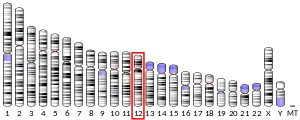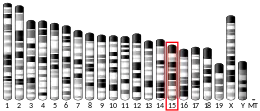Anti-Müllerian hormone receptor
Anti-Müllerian hormone receptor is a receptor for anti-Müllerian hormone. Anti-Mullerian hormone receptor type 2 is a protein that in humans is encoded by the AMHR2 gene.[5]
Function
Both men and women have this gene
Pathology
The anti-Müllerian hormone receptor (Müllerian Inhibiting Substance Type II Receptor) can be responsible for persistent Müllerian duct syndrome.
Müllerian inhibiting substance type II receptor (MISIIR), also known as the Anti-Müllerian Hormone Receptor, is expressed by ovarian, breast, and prostate cancers and these cancer cells have been reported to apoptose in response to exposure to the Müllerian inhibiting substance (MIS).[6]
Antibodies have been developed that specifically target MISIIR and may be useful as vehicles for drugs and toxins for targeted cancer therapy.[7][8][9]
References
- GRCh38: Ensembl release 89: ENSG00000135409 - Ensembl, May 2017
- GRCm38: Ensembl release 89: ENSMUSG00000023047 - Ensembl, May 2017
- "Human PubMed Reference:". National Center for Biotechnology Information, U.S. National Library of Medicine.
- "Mouse PubMed Reference:". National Center for Biotechnology Information, U.S. National Library of Medicine.
- "Entrez Gene: Anti-Mullerian hormone receptor type 2". Retrieved 2018-06-07.
- Masiakos PT, MacLaughlin DT, Maheswaran S, Teixeira J, Fuller AF, Shah PC, Kehas DJ, Kenneally MK, Dombkowski DM, Ha TU, Preffer FI, Donahoe PK (November 1999). "Human ovarian cancer, cell lines, and primary ascites cells express the human Mullerian inhibiting substance (MIS) type II receptor, bind, and are responsive to MIS". Clinical Cancer Research. 5 (11): 3488–99. PMID 10589763.
- Yuan QA, Robinson MK, Simmons HH, Russeva M, Adams GP (March 2008). "Isolation of anti-MISIIR scFv molecules from a phage display library by cell sorter biopanning". Cancer Immunology, Immunotherapy. 57 (3): 367–78. doi:10.1007/s00262-007-0376-2. PMID 17676323. S2CID 13075446.
- Yuan QA, Simmons HH, Robinson MK, Russeva M, Marasco WA, Adams GP (August 2006). "Development of engineered antibodies specific for the Müllerian inhibiting substance type II receptor: a promising candidate for targeted therapy of ovarian cancer". Molecular Cancer Therapeutics. 5 (8): 2096–105. doi:10.1158/1535-7163.MCT-06-0115. PMID 16928831.
- Salhi I, Cambon-Roques S, Lamarre I, Laune D, Molina F, Pugnière M, Pourquier D, Gutowski M, Picard JY, Xavier F, Pèlegrin A, Navarro-Teulon I (May 2004). "The anti-Müllerian hormone type II receptor: insights into the binding domains recognized by a monoclonal antibody and the natural ligand". The Biochemical Journal. 379 (Pt 3): 785–93. doi:10.1042/BJ20031961. PMC 1224123. PMID 14750901.
- This article incorporates text from the United States National Library of Medicine, which is in the public domain.
Further reading
- Teixeira J, Maheswaran S, Donahoe PK (October 2001). "Müllerian inhibiting substance: an instructive developmental hormone with diagnostic and possible therapeutic applications". Endocr. Rev. 22 (5): 657–74. doi:10.1210/edrv.22.5.0445. PMID 11588147.
- Picard JY, Belville C (2002). "[Genetics and molecular pathology of anti-Mullerian hormone and its receptor]". J. Soc. Biol. (in French). 196 (3): 217–21. doi:10.1051/jbio/2002196030217. PMID 12462075.
- Wang HQ, Takakura K, Takebayashi K, Noda Y (December 2002). "Mutational analysis of the müllerian-inhibiting substance gene and its receptor gene in Japanese women with polycystic ovary syndrome and premature ovarian failure". Fertil. Steril. 78 (6): 1329–30. doi:10.1016/s0015-0282(02)04351-0. PMID 12477536.
- Salhi I, Cambon-Roques S, Lamarre I, Laune D, Molina F, Pugnière M, Pourquier D, Gutowski M, Picard JY, Xavier F, Pèlegrin A, Navarro-Teulon I (May 2004). "The anti-Müllerian hormone type II receptor: insights into the binding domains recognized by a monoclonal antibody and the natural ligand". Biochem. J. 379 (Pt 3): 785–93. doi:10.1042/BJ20031961. PMC 1224123. PMID 14750901.
- Kevenaar ME, Themmen AP, Laven JS, Sonntag B, Fong SL, Uitterlinden AG, de Jong FH, Pols HA, Simoni M, Visser JA (June 2007). "Anti-Müllerian hormone and anti-Müllerian hormone type II receptor polymorphisms are associated with follicular phase estradiol levels in normo-ovulatory women". Hum. Reprod. 22 (6): 1547–54. doi:10.1093/humrep/dem036. PMID 17337470.
- Kevenaar ME, Themmen AP, Laven JS, Sonntag B, Fong SL, Uitterlinden AG, de Jong FH, Pols HA, Simoni M, Visser JA (June 2007). "Anti-Müllerian hormone and anti-Müllerian hormone type II receptor polymorphisms are associated with follicular phase estradiol levels in normo-ovulatory women". Hum. Reprod. 22 (6): 1547–54. doi:10.1093/humrep/dem036. PMID 17337470.
- Kevenaar ME, Themmen AP, Rivadeneira F, Uitterlinden AG, Laven JS, van Schoor NM, Lips P, Pols HA, Visser JA (September 2007). "A polymorphism in the AMH type II receptor gene is associated with age at menopause in interaction with parity". Hum. Reprod. 22 (9): 2382–8. doi:10.1093/humrep/dem176. PMID 17636279.
- Kevenaar ME, Themmen AP, Rivadeneira F, Uitterlinden AG, Laven JS, van Schoor NM, Lips P, Pols HA, Visser JA (September 2007). "A polymorphism in the AMH type II receptor gene is associated with age at menopause in interaction with parity". Hum. Reprod. 22 (9): 2382–8. doi:10.1093/humrep/dem176. PMID 17636279.
- Bakkum-Gamez JN, Aletti G, Lewis KA, Keeney GL, Thomas BM, Navarro-Teulon I, Cliby WA (January 2008). "Müllerian inhibiting substance type II receptor (MISIIR): a novel, tissue-specific target expressed by gynecologic cancers". Gynecol. Oncol. 108 (1): 141–8. doi:10.1016/j.ygyno.2007.09.010. PMID 17988723.
External links
- Anti-Mullerian+hormone+receptor at the US National Library of Medicine Medical Subject Headings (MeSH)



